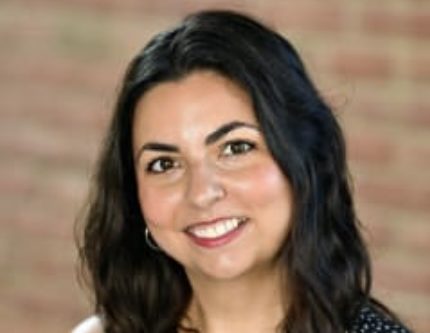
Upper School English Teacher Monica Schroeder has experienced nearly every type of schooling — homeschooled until sixth grade, followed by classes at public, private and boarding schools. However, Sidwell holds a special place for her; it is the first high school where she has taught.
Schroeder began teaching as a graduate student at Catholic University, where she is currently completing her doctorate. Working as a writing instructor familiarized her with many diverse topics. However, of all these subjects, she most enjoys teaching English literature at Sidwell. “Literature is what I’m getting my PhD in and literature is always kind of my primary interest, so it’s very fun that this is what I get to do here,” she said.
When she began teaching at Sidwell, Schroeder explained, “I was expecting there to be a bigger transition than what I felt there was.” The transition from teaching college to high school was easier than Schroeder had expected: “Good writing and reading are the same across all disciplines,” she said.
“Obviously, there are some differences,” she said, “but getting students to think critically and deeply about what they’re reading, and thinking about their argument, and thinking about how to be persuasive to the audience — that’s going to hold true if you’re writing for history, if you’re writing for business, if you’re writing for English.”
Reflecting on literature’s importance, she described it as “beautiful,” noting that “we see something true about the world when we read works of great art.” On a practical level, she explained, analyzing characters’ actions “helps us practice our own sense of judgment that we can bring into the world” while also fostering “our sense of empathy.”
She added, “Literature shows readers something true about the world in some way. Sometimes it mimics our experience, and sometimes it doesn’t. And seeing the different kinds of worlds that literature presents, in some way, helps foster our sense of realism and idealism.”
Schroeder is especially drawn to the complexity and tension inherent in art. Reflecting on the Renaissance, she shared a quote from Philip Sydney: “Literature models the golden world, but it also shows us the world as it is,” capturing the tension between dark and light that characterizes much of the period’s art. She added, “I think we lose something if we don’t read. Maybe we’re less equipped to understand those natural tensions in the world around us.”
She also seeks to emphasize the values of curiosity and humility to her students. Teaching Classical and Heroicliterature to many students who have never read the classics before, Schroeder recognizes that the subject might feel “dusty and moldy.”
“And I would like them to like it,” she continued, “but I also don’t really care if they like it, because I think that it allows them to explore it and figure it out on their own terms.” To Schroeder, exposure to the new material is what counts.
Schroeder is also inspired by the anonymous poet who wrote “Sir Gawain and the Green Knight.” “Especially in a time in a culture where I think so much of our art, and so much of our talents, our hobbies, our interests, become so quickly commodified,” when “we either want to think about how we want to sell it or turn it into a career… There’s something really cool about the Gawain poet just sitting down and writing it, maybe showing it to some of his friends, but for the most part… [doing] it because it was neat,” Schroeder said.
Will we ever live in a world akin to the Gawain poet’s world?
“I would love to see that,” Schroeder said. “And I think that that’s something that we as teachers are up against often.” She explained that she and other teachers work to “keep a childlike sense of wonder when it comes to just appreciation of our education, and learning, and art, and kind of interacting with it first and foremost as a means of growth and opening of our minds,” rather than as furthering careers.
“I think there’s a reason why liberal arts is called liberal, because it’s supposed to be liberating in some way,” Schroeder said. “Having a freedom of mind is really important. It’s kind of the goal. And I think that there’s a lot of tension between that and just a world of money and success and things that are just tangible realities in our world, of course … But I think that we as teachers, if we lose sight of it, I think we lose something.”










































